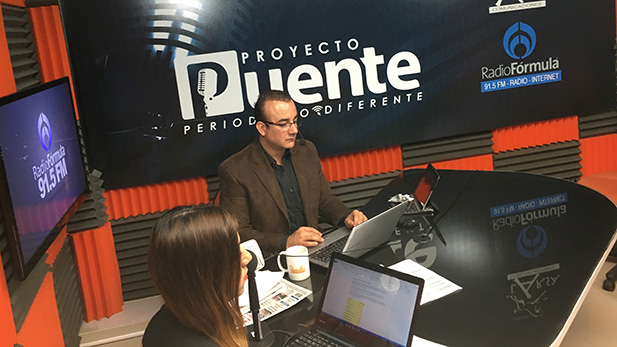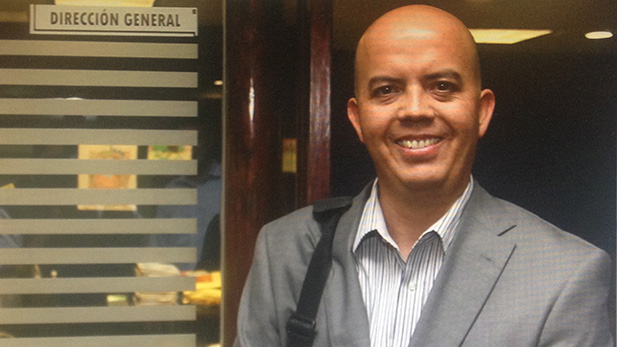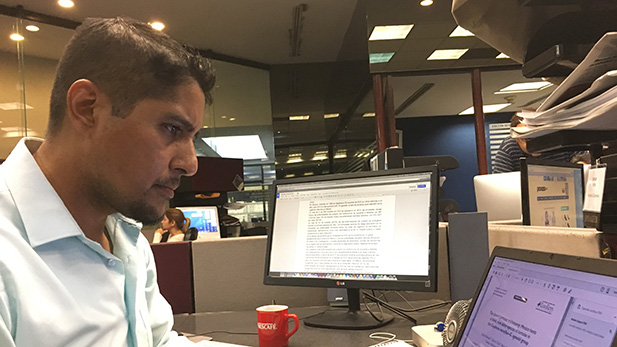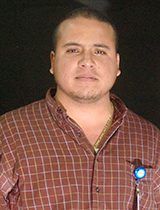 Luis Medina is co-owner of the news radio program Proyecto Puente.
Luis Medina is co-owner of the news radio program Proyecto Puente.Listen:
HERMOSILLO, SONORA — Mexico remains one of the deadliest and most corrupted countries in the world for reporters to do their job. But what happens when a former journalist is accused of targeting his old colleagues?
Luis Medina is animated, almost yelling into his microphone as he encourages people to call into his radio station with their problems and issues.
He is deejaying live in the city of Hermosillo, the capital of the U.S. border state of Sonora. He’s co-owner of the news radio program Proyecto Puente. He bills it as a new kind of journalism for this northern Mexico state.
He relies on listeners to reach him through Twitter, WhatsApp and Facebook with their complaints about the government, crime and social issues — from schools to taxes.
"I think that for Sonora, we create a different kind of journalist. So we started this six years ago, and I created Proyecto Puente," he said.
It’s a new kind of journalism but it ran into an old problem here in Mexico: blackmail and corruption.
This is what prosecutors here in Sonora say happened:
Medina’s radio station was just one news media outlet that was allegedly targeted by Jorge Morales Borbon, the spokesman for the former governor of Sonora. Prosecutors allege that Morales received 1 million pesos, a little more than $53,000 from a news media company in exchange for handling an outstanding debt owed to that news agency.
"They accuse Jorge Morales for extortion. But the attorney here has a lot of accusations against Jorge Morales about other things but they’re not saying what kind of accusations right now," Medina said.
 Jorge Morales Borbon, former government spokesman, is accused of extortion against the owners of media companies in Mexico.
Jorge Morales Borbon, former government spokesman, is accused of extortion against the owners of media companies in Mexico.Morales' arrest last February surprised people on both sides of the border. Matthew Benson was former Arizona governor Jan Brewer’s spokesman and worked alongside Morales during cross-border negotiations between the two state.
"Anytime you have a colleague or somebody that you worked with in that kind of capacity and then see the kind of allegations that have been lodged against him, that’s surprising. I don’t claim to know Jorge well but this was someone that was my counterpart on the Sonoran side, so to see that he’s being accused of extortion and threats against media entities, that certainly caught me off-guard," Benson said.
In Sonora, reporters who worked for Morales were stunned.
"It’s a sad thing that is happening to him because I know him. A lot of people know him," said Jesus Ibarra, a veteran newspaper reporter in Hermosillo.
 Jesus Ibarra is a veteran newspaper reporter in Hermosillo.
Jesus Ibarra is a veteran newspaper reporter in Hermosillo.Up until his stint as a spokesman for the previous governor, Morales was news director for El Imparcial, the largest newspaper in this state. The respected paper is nearly 80 years old.
 In 2005, top investigative reporter Alfredo Jimenez disappeared on assignment in Hermosillo. He has never been found.
In 2005, top investigative reporter Alfredo Jimenez disappeared on assignment in Hermosillo. He has never been found.Ibarra worked under Morales even as threats against newspaper reporters in Mexico began to escalate. These days, the Committee to Protect Journalists lists Mexico as one of the most dangerous countries in the world for reporters to do their job. There was a time here when Morales guided his reporters through investigations into organized crime and the type of government corruption for which he’s now accused. In 2005, one of Morales’ top investigative reporters disappeared on assignment in Hermosillo. Alfredo Jimenez has never been found.
"It’s been 11 years since Alfredo disappeared, and we still have no answer and no people in jail for this aberration, this crime that happened," Ibarra said.
Jimenez’s disappearance was linked to security officials working for the government. Morales worked for a new administration that promised to stamp out that kind of crime. His lawyer declined to comment. His wife has publicly accused gunmen of stalking her while her husband sits in prison.
A judge has until later this year to determine whether Morales is guilty. But in the meantime, reporters like Ibarra and Proyecto Puentes owner Medina believe other accusations against the once-respected newspaperman will begin to surface.
Fronteras Desk is a collaborative of public media entities in Arizona, California, Nevada, New Mexico and Texas including Arizona Public Media.

By submitting your comments, you hereby give AZPM the right to post your comments and potentially use them in any other form of media operated by this institution.